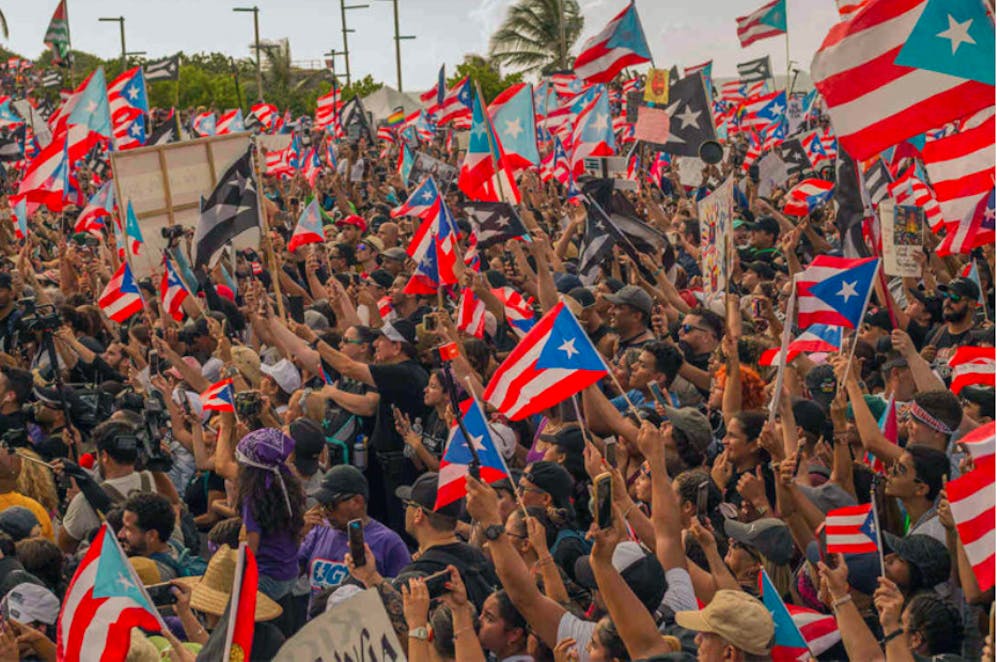Keeping the failed government response to Hurricane Maria in mind, ongoing crises of poor energy policy and crumbling infrastructure remains clear as Puerto Rico was ravaged by Hurricane Fiona, experiencing week-long power blackouts.
For context purposes, Puerto Rico’s power grid is managed not by the state— but by a private company Luma Energy, which has managed the island’s power grid since summer of 2021. As a relic of colonialism, Puerto Rico is dependent on the United States government, specifically the Federal Emergency Management Agency (FEMA), to coordinate disaster relief initiatives and approve funds for storm damage and infrastructure repairs.
After Hurricane Fiona battered the island, the entire power grid collapsed leaving millions of Puerto Ricans without electricity for weeks. Similar to the aftermath of Hurricane Maria in 2017, many Boricuas were without basic necessities like running water, power, and a reliable supply of food. Especially, given the Trump Administration’s apathetic response— as the former President threw toilet paper at an assembled crowd, Trump’s general incompetence culminating in his assessment that disaster relief is hard because “it’s an island surrounded by water” showing his administration had no plan to alleviate Hurricane Maria’s damage on the people of Puerto Rico.
Notably, the Puerto Rican territorial government failed to report an increased death toll that eventually peaked at 3,025 showing the consequences of poor public leadership at the local and national levels.With the failed response to Hurricane Maria in mind, the Biden Administration’s response to Hurricane Fiona was far more effective and incumbent of the Office of the President. Immediately addressing the nation, President Biden issued an executive order declaring Hurricane Fiona an “major emergency”. After Biden’s prompt declaration, the commander in chief personally visited Puerto Rico and reaffirmed his support for the Puerto Rican people. However, months prior, unlike Biden’s congeniality towards Puerto Rico, the Supreme Court in 8-1 decision overturned certain federal benefits for Puerto Rican veterans seeking benefits for disability and other conditions.
In her lone forceful dissent with the majority opinion, the Court’s first and only Puerto Rican member, Justice Sonia Sotomayor, condemned the Court’s finding equating it to the ca second class citizenship and calling for reversal of the Insular cases which were early 20th century Supreme Court cases that originally determined Puerto Rico’s political status and sovereignty as a U.S. territory and initially deprived Puerto Ricans of US citizenship.
Though Biden swiftly responded to Hurricane Fiona, Puerto Rico’s inherently racist colonial status and enduring issue of hurricanes and tropical storms jeopardizes its residents’ lives, rights, and incorporation in the greater scheme of American society. As an unincorporated territory, Puerto Rico is subject to the sole authority of Congress which can override its governmental decisions at any time. Also, despite its exemption from many federal taxes, Puerto Rico is also highly vulnerable to private interests as its energy and property have been seized by Luma energy and Airbnb which have respectively deprived Puerto Ricans of power during crises and housing during economic downturns and other precarious financial periods.
As I reflect on Hurricane Fiona and Maria’s deadly and catastrophic toll on Puerto Rico, I remain hopeful for the island given its incredible and resilient people, but question the strength of its infrastructure and the willingness of the United States government to continue to response diligently to Puerto Rico’s natural disasters and other dilemmas.
Works Cited Page:
https://prospect.org/politics/puerto-rico-colonial-status-vulnerable-hurricane-fiona/
https://www.npr.org/2018/09/12/646997771/fact-check-puerto-rico-was-an-incredible-unsung-success



